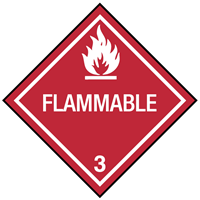
 Print
Print
Chemical Datasheet
PROPYLENE GLYCOL METHYL ETHER ACETATE |

|
Chemical Identifiers
| CAS Number |
UN/NA Number |
DOT Hazard Label |
USCG CHRIS Code |
|
|
|
|
|
| NIOSH Pocket Guide |
International Chem Safety Card |
|
none
|
- PROPYLENE GLYCOL MONOMETHYL ETHER ACETATE
|
NFPA 704
General Description
Colorless liquid with a sweet ether-like odor. (USCG, 1999)
Hazards
Reactivity Alerts
none
Air & Water Reactions
No rapid reaction with air. No rapid reaction with water.
Fire Hazard
Special Hazards of Combustion Products: Carbon dioxide and carbon monoxide may form when heated to decomposition. (USCG, 1999)
Health Hazard
No significant adverse effects expected. (USCG, 1999)
Reactivity Profile
PROPYLENE GLYCOL METHYL ETHER ACETATE is an ester. Esters react with acids to liberate heat along with alcohols and acids. Strong oxidizing acids may cause a vigorous reaction that is sufficiently exothermic to ignite the reaction products. Heat is also generated by the interaction of esters with caustic solutions. Flammable hydrogen is generated by mixing esters with alkali metals and hydrides. Incompatible with oxidizers.
Belongs to the Following Reactive Group(s)
- Esters, Sulfate Esters, Phosphate Esters, Thiophosphate Esters, and Borate Esters
- Ethers
Potentially Incompatible Absorbents
No information available.
Response Recommendations
Isolation and Evacuation
Excerpt from ERG Guide 127 [Flammable Liquids (Water-Miscible)]:
IMMEDIATE PRECAUTIONARY MEASURE: Isolate spill or leak area for at least 50 meters (150 feet) in all directions.
LARGE SPILL: Consider initial downwind evacuation for at least 300 meters (1000 feet).
FIRE: If tank, rail tank car or highway tank is involved in a fire, ISOLATE for 800 meters (1/2 mile) in all directions; also, consider initial evacuation for 800 meters (1/2 mile) in all directions. (ERG, 2024)
Firefighting
Fire Extinguishing Agents Not to Be Used: Water.
Fire Extinguishing Agents: Water spray, alcohol foam, dry chemical, or carbon dioxide. (USCG, 1999)
Non-Fire Response
Excerpt from ERG Guide 127 [Flammable Liquids (Water-Miscible)]:
ELIMINATE all ignition sources (no smoking, flares, sparks or flames) from immediate area. All equipment used when handling the product must be grounded. Do not touch or walk through spilled material. Stop leak if you can do it without risk. Prevent entry into waterways, sewers, basements or confined areas. A vapor-suppressing foam may be used to reduce vapors. Absorb or cover with dry earth, sand or other non-combustible material and transfer to containers. Use clean, non-sparking tools to collect absorbed material.
LARGE SPILL: Dike far ahead of liquid spill for later disposal. Water spray may reduce vapor, but may not prevent ignition in closed spaces. (ERG, 2024)
Protective Clothing
Safety goggles, protective clothing. Use approved respirator when possibility exists of encountering vapor. (USCG, 1999)
DuPont Tychem® Suit Fabrics
No information available.
First Aid
Call for medical aid.
EYES: Wash with water for 15 min.; call a physician.
SKIN: Remove contaminated clothing and wash skin with soap and water.
INGESTION: Induce vomiting after drinking two glasses of water. (USCG, 1999)
Physical Properties
Flash Point:
114°F
(USCG, 1999)
Lower Explosive Limit (LEL):
1.3 %
at 173°F
(USCG, 1999)
Upper Explosive Limit (UEL):
13.1 %
at 283°F
(USCG, 1999)
Autoignition Temperature:
670°F
(USCG, 1999)
Melting Point: data unavailable
Vapor Pressure: data unavailable
Vapor Density (Relative to Air): data unavailable
Specific Gravity:
0.969
at 68°F
(USCG, 1999)
- Less dense than water; will float
Boiling Point:
302°F
at 760 mmHg
(USCG, 1999)
Molecular Weight:
132.16
(USCG, 1999)
Water Solubility: data unavailable
Ionization Energy/Potential: data unavailable
IDLH: data unavailable
AEGLs (Acute Exposure Guideline Levels)
No AEGL information available.
ERPGs (Emergency Response Planning Guidelines)
| Chemical |
ERPG-1 |
ERPG-2 |
ERPG-3 |
|
| Propylene Glycol Methyl Ether Acetate (108-65-6 alpha-isomer) (70657-70-4 beta-isomer)
|
50 ppm  |
1000 ppm |
5000 ppm  |
LEL = 15000 ppm |
(AIHA, 2022)
PACs (Protective Action Criteria)
| Chemical |
PAC-1 |
PAC-2 |
PAC-3 |
|
| Propylene glycol monomethyl ether acetate, alpha-isomer; (1-Methoxypropyl-2-acetate) (108-65-6)
|
50 ppm |
1000 ppm |
5000 ppm  |
LEL = 15000 ppm |
(DOE, 2024)
Regulatory Information
EPA Consolidated List of Lists
No regulatory information available.
CISA Chemical Facility Anti-Terrorism Standards (CFATS)
No regulatory information available.
OSHA Process Safety Management (PSM) Standard List
No regulatory information available.
Alternate Chemical Names
- 1-METHOXY-2-PROPANOL ACETATE
- PROPYLENE GLYCOL METHYL ETHER ACETATE


 Print
Print
